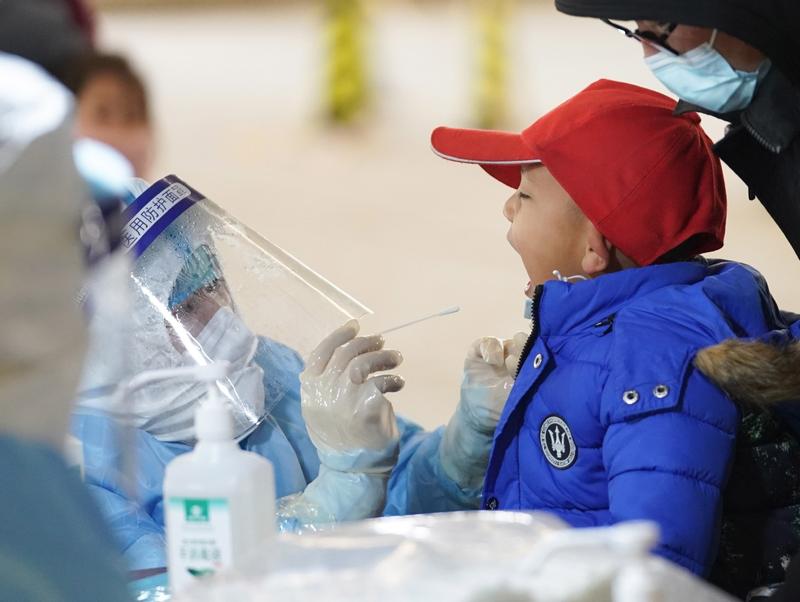 A child is given a nucleic acid test for COVID-19 in Beijing's Daxing district on Jan 20, 2021, as the district starts mass testing for all residents. (PHOTO / XINHUA)
A child is given a nucleic acid test for COVID-19 in Beijing's Daxing district on Jan 20, 2021, as the district starts mass testing for all residents. (PHOTO / XINHUA)
Two of the recent COVID-19 patients found in Beijing's Daxing district were carrying the highly transmissible variant of the novel coronavirus first detected in the United Kingdom, Pang Xinghuo, deputy head of the Beijing Center for Disease Control and Prevention, said on Wednesday.
Also, the residential community where cluster infections were reported was designated a high-risk area, Pang said at a news conference.
The finding on the two cases of the UK variant has been confirmed by the Beijing Center for Disease Control and Prevention, said Pang Xinghuo, deputy head of the Beijing Center for Disease Control and Prevention, adding that the source of the two infections was suspected of having been imported
The finding on the two cases has been confirmed by the Beijing Center for Disease Control and Prevention, Pang said, adding that the source of the two infections was suspected of having been imported.
Variants detected in the UK and South Africa, which epidemiologists have found to be more transmissible than previous versions, have become the predominant strains in some regions. That means prevention and control of such strains is more difficult, Feng Zijian, deputy director of the Chinese Center for Disease Control and Prevention, said at a news conference on Wednesday afternoon.
Beijing reported seven new local COVID-19 cases on Tuesday, and six of the patients live in the Ronghui community in Daxing district. Of the 11 new confirmed cases reported in Beijing in the past three days, 10 were from the Ronghui community-now the capital's only high-risk area-and one was from Shunyi district. The Shunyi patient was a close contact of a confirmed patient in Daxing.
ALSO READ: Virus: Beijing district restricts residents from leaving city
As of Wednesday, there were six high-risk areas around China.
“The cluster infection occurred in three families and the virus has further spread among colleagues and friends," Pang said. "It has reminded us that people should not get together during the epidemic period and should continue to be cautious, given the infection risk."
One of the confirmed patients in Daxing is a 9-year-old schoolchild, the grandson of another confirmed patient. All 1,081 students and teachers of his school were relocated to 17 hotels for centralized quarantine and medical observation on Tuesday.
The Daxing government started mass nucleic acid testing for all its residents on Wednesday.
Residents are required to stay in Beijing unless it is necessary to leave. All educational institutions are closed and students must stay at home.
Recent outbreaks in Beijing and in Hebei, Heilongjiang and Jilin provinces have shown trends such as cluster infections that are spread rapidly and cover a large area, and most originated with contamination of imported frozen goods or through people arriving from overseas, Wang Bin, inspector of the Bureau of Disease Control and Prevention of the National Health Commission, said on Wednesday.
READ MORE: Over 15m COVID-19 vaccine doses administered in China
Mi Feng, a health commission spokesman, said on Wednesday that China added 757 locally transmitted confirmed cases in the past week, and the number of close contacts under medical observation has reached a 10-month high.
"Most of the clusters happened in rural areas, which shows that we still face a complicated virus control situation," he said.
Jilin reported 46 new local cases and seven asymptomatic carriers on Tuesday, increasing the tally to 133 confirmed cases and 57 asymptomatic carriers detected after similar carriers returned from neighboring Heilongjiang, said Zhang Yan, deputy director of the commission.
Among the total, 144 were in some way connected to a single infected person, said Zhang, adding that more than 60 percent are over 60 years old and the oldest person is 92.
Improvement has been seen in Hebei, where, in the past four days, there has been a decrease in the single-day reports of new confirmed COVID-19 patients.
"The increase in the cases in Hebei has been clearly contained after resolute measures were taken such as mass nucleic acid testing and centralized quarantine," Feng from the China CDC said.
Zhang Yu in Shijiazhuang and Zhou Huiying in Harbin contributed to this story.


